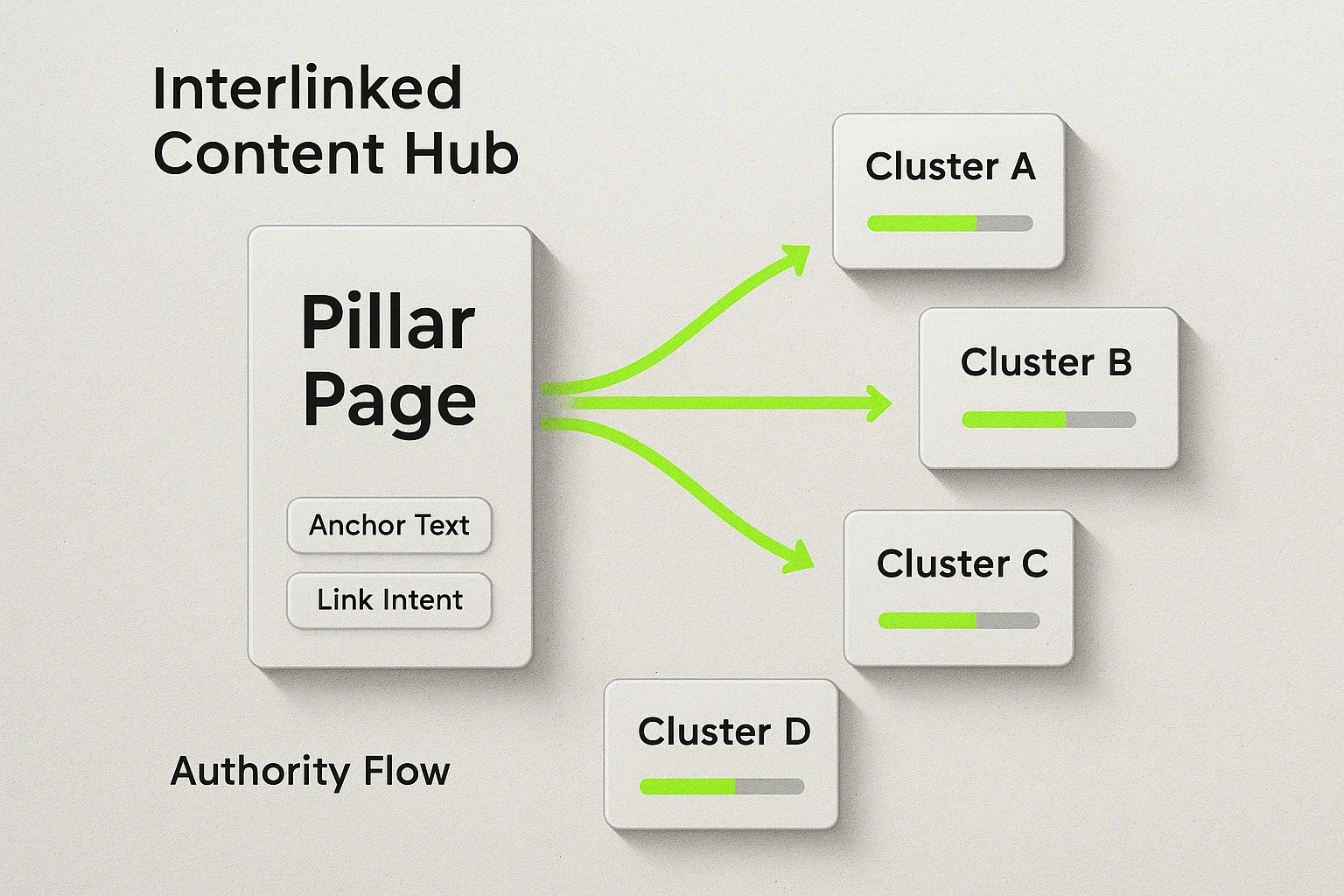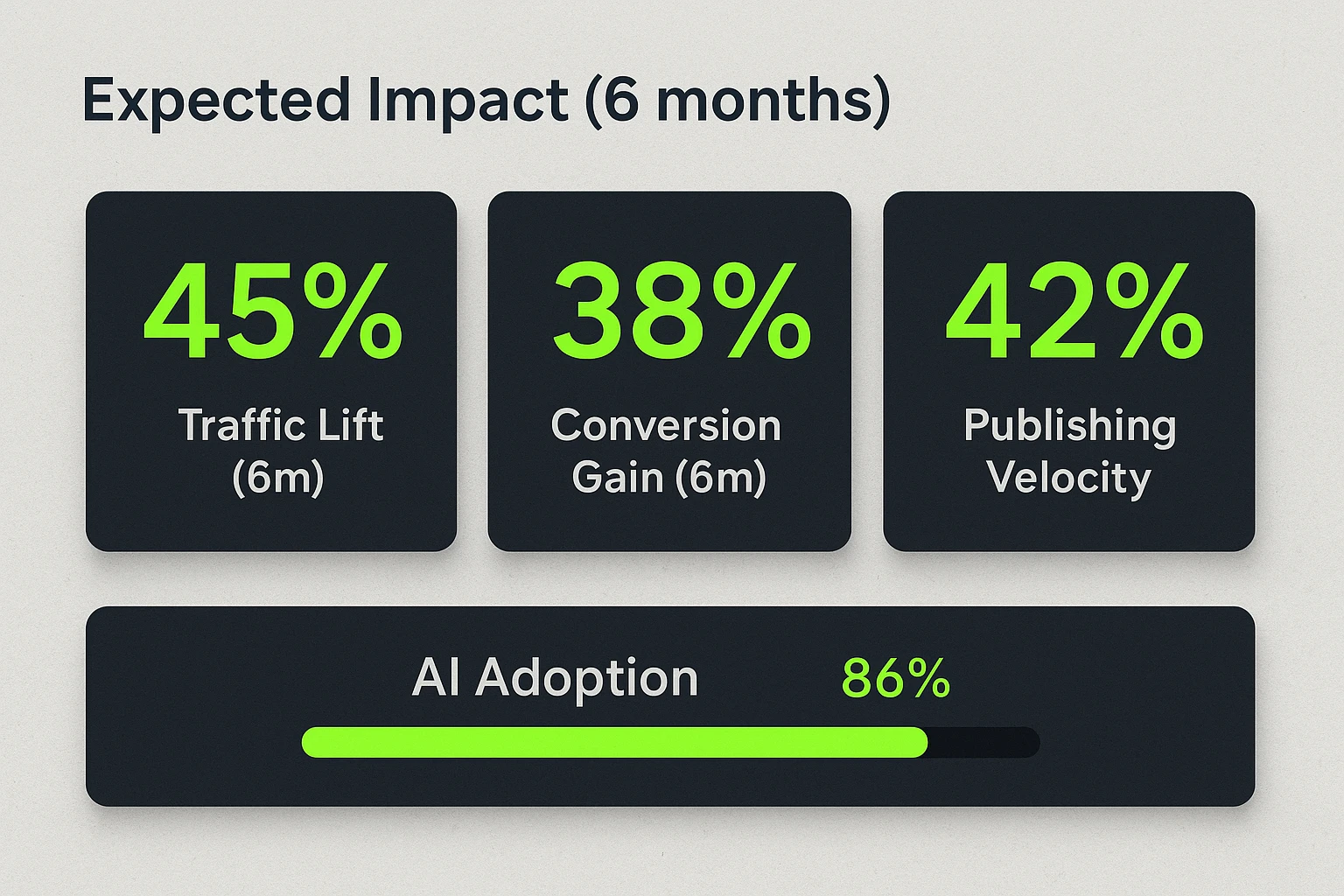Crafting Semantic Authority with AI: The Small Business Playbook
AI Summary
You've seen the shift. Content that once ranked with simple keywords is now lost in a sea of AI Overviews and sophisticated competitors. Large enterprises are investing heavily in "semantic SEO," leaving you wondering if it's even possible for a small business to compete. They talk about enterprise-level strategies and expensive tools, but they miss the most important question: how do you actually do this with a small team and a realistic budget?
This is not another high-level guide that leaves you with more questions than answers. This is your practical, step-by-step playbook for using affordable AI to build deep, lasting authority in your niche. The kind of authority that makes Google see you as the definitive source, driving sustainable organic growth. With 86% of SEO professionals now integrating AI, the choice isn't whether to adapt, but how to do it efficiently.
Beyond Keywords: What Semantic Authority Really Means
For years, SEO was a game of keywords. Today, it's about concepts, relationships, and intent. Search engines like Google no longer just match words; they understand the meaning behind them. This is the core of semantic search.
Semantic authority is what happens when Google recognizes your website as a comprehensive, trustworthy expert on a specific topic. You've answered not just one question, but all the related questions a user might have. You've built a web of interconnected content that covers a subject so thoroughly that search engines have no choice but to consider you a primary source.
For a small business, this is a powerful advantage. You don't need a massive budget to dominate a niche. You need a smarter strategy that focuses on depth over breadth, and AI is the tool that makes this level of depth achievable.
A Practical Blueprint for AI-Powered Authority
Building semantic authority isn't a single action. It's a systematic process of mapping your topic, optimizing for meaning, and structuring your content intelligently. Here’s how to get it done.
Step 1: AI-Powered Topic Mapping for Niche Dominance
Your goal is to create a complete map of your niche. This map will guide all future content creation, ensuring every article you publish builds upon the last, strengthening your overall authority.
First, you need to identify your core pillar topics and the cluster of related subtopics that support them. AI tools can accelerate this process from days to minutes. Start by feeding a broad seed term into an AI brainstorming tool to generate a wide range of potential pillar page ideas.
From there, use AI to expand on each pillar. Prompt it to identify semantically related terms, common user questions from "People Also Ask" sections, and long-tail queries that real customers are searching for. This helps you build out comprehensive topic clusters that cover every angle. While enterprise solutions exist, many affordable tools offer powerful features for this exact task. The key is to find a balance between robust capabilities and a small business budget.
This process ensures your entire content ecosystem is cohesive. Every piece has a purpose, making your site easier for both users and search engines to navigate and understand. This structure is foundational for creating content tuned for AI search systems.
Step 2: Entity Optimization to Become the Definitive Source
Entities are the "things" Google understands: people, places, organizations, and concepts. When you optimize for entities, you're helping Google connect the dots and recognize your expertise. For example, instead of just mentioning "our CEO," you'd also mention their name, their credentials, and their connection to your company. This provides clear, unambiguous signals of authority.
AI tools can scan your content and your competitors' content to identify the key entities within your niche. Use these insights to enrich your articles.
- Define Key Terms: Clearly explain important concepts and entities related to your topic.
- Establish Relationships: Show how different entities connect to one another and to your core subject.
- Use Structured Data: Implement simple Schema markup for your organization, products, and FAQs. This gives search engines structured information, making your expertise machine-readable.
By focusing on entities, you build layers of trust and context. You are no longer just a collection of articles. You are a knowledge base.

Step 3: Architecting Content Hubs for Topical Dominance
Your topic maps and entity-rich content need a home. A well-designed content architecture, built around pillar pages and topic clusters, is what channels authority and signals your expertise to Google.
Your pillar page should be a comprehensive guide on a broad topic. Your cluster content should consist of more specific articles that deep-dive into subtopics, and each one should link back to the pillar page. This intentional internal linking strategy is crucial. It creates a logical hierarchy that demonstrates the depth of your knowledge.
You can even use AI to suggest relevant internal linking opportunities, ensuring your knowledge hub is tightly woven together. This structure not only improves SEO but also keeps users on your site longer, guiding them through a complete learning journey.

The Human Element: Proving E-E-A-T with AI
In the AI era, Google's E-E-A-T guidelines (Experience, Expertise, Authoritativeness, Trustworthiness) are more important than ever. Anyone can generate generic text with AI, but small businesses have a unique advantage: genuine, first-hand experience.
AI should be your assistant, not your author. Use it to structure outlines, generate ideas, and optimize for entities. Then, infuse your unique human insight.
- Show, Don't Just Tell: Add personal anecdotes, original case studies, and customer testimonials.
- Credit Your Experts: Create detailed author bios that highlight their real-world experience and credentials.
- Maintain Accuracy: Fact-check every claim and cite credible, authoritative sources. Transparency builds trust.
This human-AI synergy is what separates winning content from the noise. It's how you prove that your content is not just comprehensive but also credible and trustworthy. Mastering E-E-A-T in the era of AI is the ultimate differentiator.
Evaluating the Impact: What Success Looks Like
Building semantic authority is a long-term strategy, but the results are transformative. Businesses that successfully implement AI-driven content strategies report up to a 45% increase in organic traffic and a 38% bump in conversion rates.
As you build out your content hubs, you'll start to rank for hundreds of long-tail keywords you never directly targeted. Your domain authority will grow, and your site will become more resilient to algorithm updates because you've built your foundation on genuine expertise, not fleeting SEO tricks. The question then becomes, how to calculate the Long Term Value. The answer lies in the sustainable, compounding growth that topical authority provides.

Frequently Asked Questions
Is this approach too complex for a small business?
Not with the right framework. The process of topic mapping, entity optimization, and content architecture can be broken down into simple, manageable steps. Using affordable AI tools streamlines the research and planning, making it far more accessible than it was just a few years ago. The key is to start with one core topic and build out from there.
Will using AI for content get me penalized by Google?
Google's guidelines are focused on the quality and helpfulness of content, not how it was created. Using AI to generate generic, low-value articles can hurt your rankings. However, using AI as a tool to assist in creating well-researched, comprehensive, and original content that showcases your unique E-E-A-T is a winning strategy. It's about human-AI collaboration, not blind automation.
How long does it take to see results from building semantic authority?
This is not an overnight fix. Building true authority takes time and consistency. You may start seeing positive movement in rankings for specific long-tail keywords within a few months, but the full impact on broader terms and overall site authority typically takes 12 to 24 months of consistent effort. The benefit is that these results are far more stable and lasting than short-term SEO tactics.
Can I do this with free AI tools?
You can certainly start the process with free tools. Many platforms offer free tiers that are great for initial brainstorming and basic topic research. However, to execute a full semantic strategy efficiently, investing in a few affordable, specialized tools for tasks like in-depth topic clustering and entity analysis provides a significant return by saving time and delivering more precise data.
Your Next Step to Semantic Dominance
Moving from a keyword-focused strategy to one built on semantic authority is the single most important shift a small business can make to secure its future in search. It's how you stop competing on an crowded playing field and start building a defensible moat of expertise.
You don't need an enterprise budget, just a smarter plan. By leveraging AI as your strategic partner, you can map your niche, demonstrate your expertise, and become the definitive source in your field.
If you're ready to move beyond basic content and build lasting authority, a dedicated SEO Strategist can provide the framework and execution needed to dominate your niche. It’s time to build content that works smarter, not just harder.


